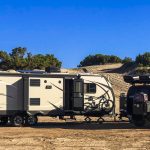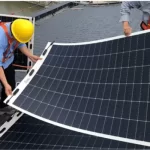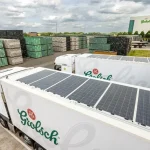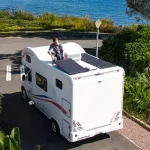Table of Contents
- Can solar power run a fridge
- how many solar panels do i need to power a refrigerator
- Key points about the solar-powered refrigerator
- Components Needed to Power a Refrigerator with Solar Panels
- how to calculate how many solar panels you need to power your refrigerator
- can a 200-watt solar panels run a refrigerator
- can a 300-watt solar panels run a refrigerator
- Can a 400 watt Solar Panel Run a Refrigerator?
- What Size Solar Panel do I Need to Run a 12v Fridge
- How to Run Appliances off Solar Power
- How much solar to run RV fridge
- Final thoughts
As we strive to reduce our carbon footprint through eco-friendly solutions, solar panels stand out as a promising alternative. Powering a refrigerator with portable solar panels is an innovative and increasingly popular approach. Solar panels offer a green and reliable power source for your cooling needs. In this article, we will explore how much solar power you need and how solar energy can run various household appliances, including your regular refrigerator and camper van fridge.
In this blog, you will discover the key factors to consider when determining the number of solar panels and batteries required to power a solar refrigerator.
Let’s dive in!
Can solar power run a fridge
Refrigerators consume a substantial amount of energy, so if you plan to use solar power, it is essential to choose the right refrigerator. When selecting a solar-powered refrigerator, there are several important factors to consider, with size being the most critical. Ensure that the refrigerator is large enough to meet your needs without being so large that it consumes unnecessary energy.
There are several advantages to using a solar-powered refrigerator over traditional models. Firstly, it is an eco-friendly solution, as it reduces reliance on fossil fuels and limits greenhouse gas emissions. Secondly, solar power can significantly reduce electricity bills by powering the appliance with renewable energy. Lastly, the autonomy provided by solar panels makes them ideal for use in areas with limited power supply, such as during camping trips or in rural locations.
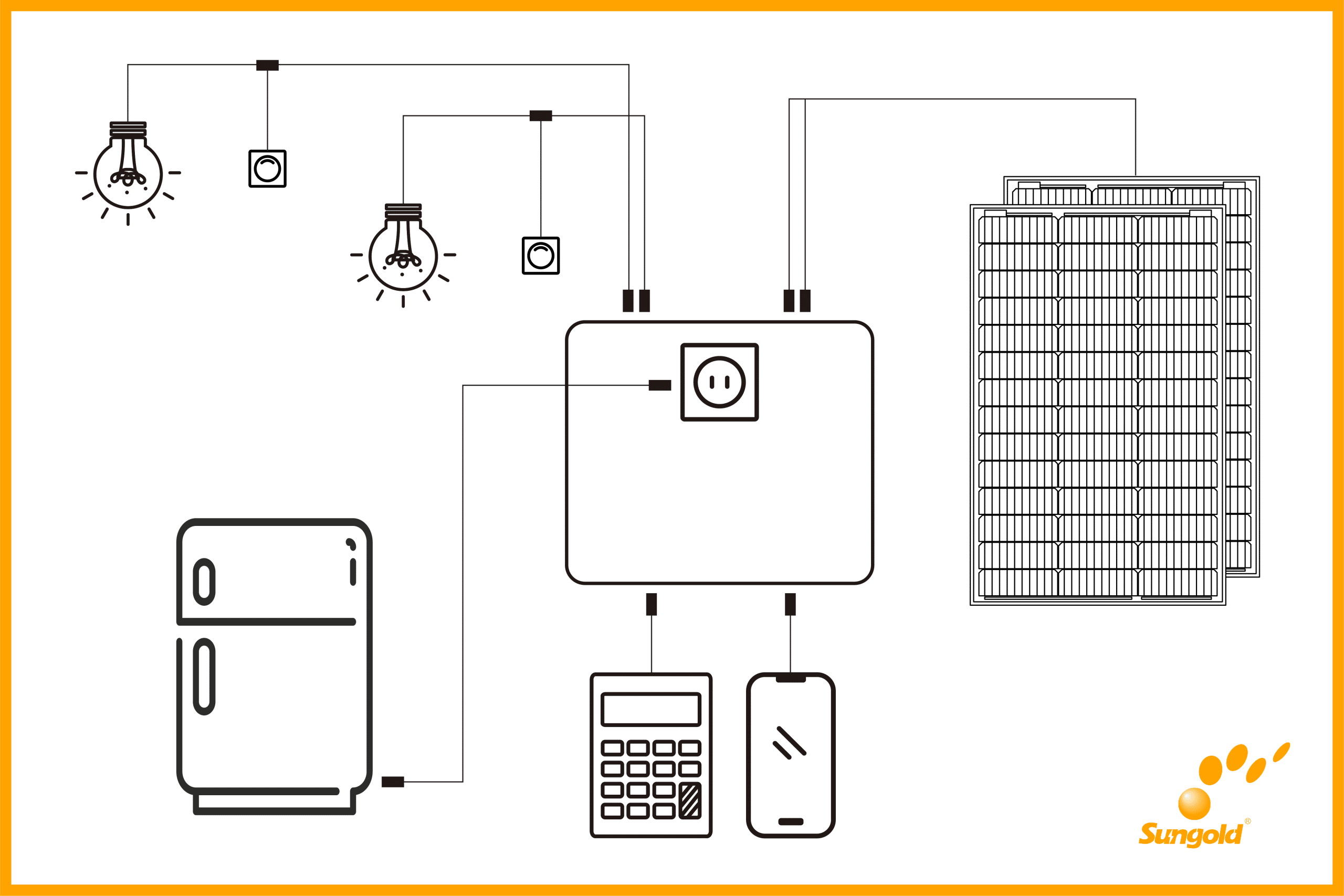
how many solar panels do i need to power a refrigerator
Solar panels are an excellent way to reduce electricity bills and protect the environment. But how many solar panels do you need to power a refrigerator? The number of solar panels required depends on the size of the refrigerator and the wattage of the solar panels. To power a refrigerator with solar panels, you must know the wattage required for its operation. This information is typically found on the appliance’s nameplate, which is located inside or on the back of the refrigerator. The wattage varies by model:
- 12V Refrigerator: between 50 and 100 watts
- Compact Refrigerator: between 150 and 300 watts
- Large Refrigerator: between 400 and 800 watts
To calculate the number of solar panels required to operate a refrigerator, it’s essential to evaluate its energy usage. Typically, refrigerators consume between 100 to 800 kWh per year. Taking an average of 500 kWh, and considering that a standard solar panel produces about 300 watts, the estimated number of panels required would range from 2 to 4. This estimation presumes daily sunlight availability of about 4 to 5 hours. For precise calculations, it’s crucial to consider the specific solar exposure and panel efficiency in your area. Using solar panels for your refrigerator not only helps in powering the appliance but also aids in reducing environmental impact and cutting down on energy expenses.
The Sungold 200 Watt 12 Volt Solar Panel is an excellent option for effective solar power generation. These panels are celebrated for their robustness and superior efficiency, making them ideal for both residential and remote applications. They are user-friendly and can be easily integrated with diverse systems. Sungold provides an assortment of wattages to meet various energy requirements, backed by strong customer service and dependable guarantees. Choosing Sungold panels ensures a secure investment, offering both functionality and environmental benefits.
With the right knowledge of these factors, you can accurately determine the necessary number of solar panels to power your refrigerator efficiently.
Key points about the solar-powered refrigerator
Running a regular refrigerator typically requires about three to four standard solar panels.
A typical household solar panel system ranges from 1 KW to 4 KW in capacity.
The number of solar panels needed depends on the type and size of the refrigerator. Additionally, the duration for which the refrigerator operates significantly impacts the amount of solar power required. A refrigerator that runs continuously will need more solar energy than one used intermittently.
Components Needed to Power a Refrigerator with Solar Panels
Photovoltaic Solar Panels To run a refrigerator using solar power, you must first choose the appropriate solar panels. The size and capacity of the panels will determine how much energy can be generated to power the refrigerator. Consider the following factors:
- The power required to run the refrigerator (measured in watts).
- The minimum amount of sunlight available in your area. The more sunlight you have, the more power your panels can generate.
Auxiliary Battery To ensure the refrigerator runs continuously without interruption, an auxiliary battery is needed to store the energy generated by the solar panels. This battery allows the refrigerator to operate during periods of low or no solar power production, such as at night.
Charge Controller and Inverter The charge controller manages the flow of energy between the solar panels, battery, and refrigerator, optimizing battery charging while protecting the electrical components. The controller must be compatible with the power output of both the solar panels and the battery to function properly.
The inverter, on the other hand, is a crucial device that converts the direct current (DC) produced by the solar panels into alternating current (AC), which is compatible with kitchen appliances, including the refrigerator.
how to calculate how many solar panels you need to power your refrigerator
Number of Solar Panels Required to Run a Refrigerator .The number of solar panels needed to run a refrigerator depends on the panels’ power output and the refrigerator’s power consumption. To calculate this, you need to know the refrigerator’s daily electricity demand, which is influenced by the size of the refrigerator, its energy efficiency rating, and the ambient temperature.
A rough estimate suggests that a refrigerator’s daily electricity demand ranges between 1.5 to 3 kilowatt-hours (kWh). For an average solar panel with a power output of 250 watts, you would need approximately 6 to 12 panels to meet the refrigerator’s daily power requirements.
However, it is important to note that the actual power consumption of a refrigerator can vary based on ambient temperature and usage patterns. For instance, in hot and humid conditions, the refrigerator will need to run more frequently to maintain its internal temperature, which increases power consumption.
Therefore, it is advisable to accurately calculate the power consumption and adjust the number of required solar panels accordingly.
can a 200-watt solar panels run a refrigerator
A Sungold 200-watt solar panel can power a refrigerator, but this depends on the size and efficiency of the refrigerator. Typically, refrigerators consume between 100 and 250 watts of electricity per hour. Therefore, a single 200-watt panel is unlikely to power a medium-sized refrigerator for more than a few hours. A 200-watt solar panel can produce approximately 160 watt-hours (Wh) of electricity per hour. Thus, a 200W solar panel (available as rigid solar panels or portable solar panels) can potentially power an RV refrigerator for 24 hours.
If you aim to run a refrigerator off-grid using solar panels, you will need a backup battery system to store the excess energy generated by the panels during the day. Additionally, you might consider adding extra panels or combining them with other renewable energy sources, such as wind turbines.
For larger appliances like freezers, multiple solar panels may be necessary to provide consistent power both day and night. The number of panels required will depend on various factors, such as location, climate conditions, and the rate of power consumption.
can a 300-watt solar panels run a refrigerator
When running a refrigerator on solar power, understanding the power and startup requirements is crucial. A refrigerator’s power consumption typically ranges from 300 to 800 watts, with startup power usually being two to three times higher. So, can a 300-watt solar panel run a refrigerator? To answer whether a Sungold 300-watt solar panel can power a refrigerator, we need to first understand what a 300-watt solar panel is and what it can do. A 300-watt solar panel is a device that converts sunlight into electrical current, which can be used to power various appliances, including refrigerators and air conditioners.
To determine if a 300-watt solar panel can run a refrigerator, consider two factors: the amount of electricity the refrigerator consumes and the amount of sunlight the solar panel receives. Most refrigerators consume about 600 watts of power, so a 300-watt solar panel cannot directly power it. However, if the refrigerator’s power consumption is lower, or if there are other appliances that consume more power, the solar panel can provide some of the required electricity.
Additionally, having a backup battery system to store excess energy generated by the solar panel can help in powering the refrigerator during periods of low sunlight or at night. This setup ensures a more reliable power supply and maximises the efficiency of your solar energy system.
Can a 400 watt Solar Panel Run a Refrigerator?
Powering a Refrigerator with Solar Panels Refrigerators consume different amounts of energy depending on their size, age, brand, and model. Newer, more efficient models use less power compared to older or larger ones. In fact, under ideal conditions, a 400W solar panel can generate enough energy to run a small, efficient refrigerator.
First, it’s important to understand how solar panels work. Solar panels consist of many small cells that convert sunlight into electricity. When sunlight hits these cells, the energy from the sun is converted into an electric current. This current is then sent through an inverter, which converts it into alternating current (AC) that can be used in your home.
One of the main factors determining how much power a solar panel can produce is its size. However, other factors also affect the efficiency of solar panels. The efficiency of a solar panel depends on the amount of power it can generate, the amount of sunlight it receives, and its angle relative to the sun. For instance, the Sungold Hi-Power 400W portable solar panel is a suitable choice for running a refrigerator, as it balances both portability and high power needs.
By understanding these factors, you can better determine how many solar panels you need and how to optimise their performance to meet your energy requirements.
What Size Solar Panel do I Need to Run a 12v Fridge
To determine the size of the solar panel needed to run a 12V refrigerator, you must first calculate the amperage used by the refrigerator. Multiply the refrigerator’s voltage by the amperage it uses; most refrigerators use around 13 amps. This will give you the wattage required by the refrigerator. Solar panels with a rating of 100W, 200W, or higher can effectively run these 12V refrigerators, which consume 40-80 watts of power.
Assume an average duty cycle of 1/3 for each refrigerator, meaning the compressor runs about 33% of the time.
The recommended solar panel size should include a buffer to address inefficiencies in the system, such as losses from the charge controller, battery, and inverter (if used). For simplicity, we assume an average system efficiency of around 80%, and five peak sunlight hours per day, which is a common average in many regions.
12V refrigerators typically consume 40-80 watts per hour, depending on their size, insulation, and efficiency. Considering the on-off cycling throughout the day, a 12V refrigerator usually uses between 320Wh and 640Wh per day. Solar panels with a rating of 100W, 200W, or higher can effectively run these 12V refrigerators.
At Sungold, we offer highly efficient portable solar panels that are perfect for 12V refrigerators, such as the 2*50W or 2*100W SPC portable charging kits.
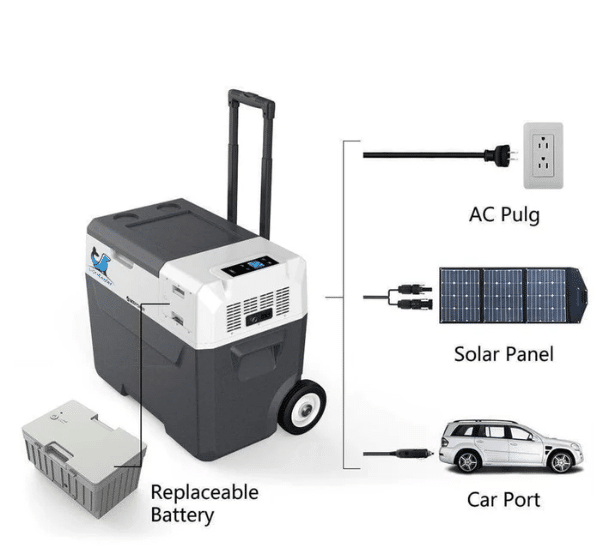
How to Run Appliances off Solar Power
When you think of solar energy, you might envision large panel arrays powering an entire home or business. But did you know you can also use solar power to run smaller appliances and meet most of your power needs? Solar panels convert sunlight into electrical energy. This energy can be used to power small appliances or stored in batteries for later use.
Most appliances have a standard AC plug that can be connected to solar panels. If your device does not have a standard AC plug, you may need to purchase an adapter.
How to Store Energy from Solar Panels
You can store energy in batteries; the batteries will charge when you are not using the energy. You can also use solar chargers to store energy in devices that do not need to be plugged in all the time. This way, you can have a continuous power supply even when the sun is not shining.
How much solar to run RV fridge
To determine how much solar power is needed to run an RV refrigerator, several factors must be considered. First is the size and efficiency of the refrigerator. Larger refrigerators require more energy to operate, while newer models are generally more energy-efficient than older ones. Another important consideration is the climate in which you will be using the refrigerator. Hotter climates will require more power because the appliance needs to work harder to maintain cool temperatures.
Once these factors are taken into account, you can estimate the number of solar panels needed. As a general rule of thumb, you can expect an RV refrigerator to require at least 100 watts of solar power per hour. This means that if you plan to use the refrigerator for an average of 8 hours a day, you will need approximately 800 watts of solar power.
Of course, this is just a rough estimate—other factors such as battery capacity and charging times can also play a role in determining the exact amount of solar power needed for your specific setup.
Considering these factors will help you better understand your solar power requirements for running an RV refrigerator and ensure you have an adequate power supply for your needs.
Final thoughts
To power a refrigerator with solar panels, you will need at least four panels. The amount of energy consumed by the refrigerator will determine the number of panels required. If you want to save on electricity bills, using solar power is an excellent choice.
Not only can you reduce your carbon footprint, but you can also save money in the long run. While calculating the exact amount of solar power needed to run a refrigerator can be challenging, the given analysis and calculations are practical and easy to understand. You can give it a try by calculating in the provided manner to see how much you can save by using solar power for your refrigerator.
Remember to carefully select all the necessary components and accurately calculate their specifications. This way, you can ensure a satisfactory user experience. If you prefer not to do the calculations yourself, buying a solar refrigerator is also a good option.




